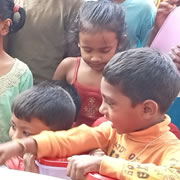Combat Malnutrition in Bangladesh: Protein-Packed Lentils Distribution & Impact
- David Burgess
- Aug 14, 2024
- 5 min read
Updated: Sep 27, 2024
Key Takeaways
Lentils are a nutrient-dense, affordable, and versatile food that can help combat malnutrition.
High protein content in lentils is essential for growth and development, especially in children.
Lotus Ministry Trust’s initiative uses lentils to improve diets and reduce malnutrition in vulnerable communities.
Community education on cooking and nutritional benefits ensures long-term success of lentil distribution programs.
Sustainable sourcing and strategic distribution are key to the program’s effectiveness.

"Lentil | Description, Nutrition ..." from www.britannica.com
Combat Malnutrition in Bangladesh: Protein-Packed Lentils Distribution & Impact
Understanding Malnutrition in Bangladesh
Malnutrition is a pressing issue in Bangladesh, affecting millions of people, particularly children. It’s not just about hunger; it’s about a lack of essential nutrients that are vital for healthy growth and development. The consequences of malnutrition are severe, leading to stunted growth, weakened immune systems, and increased susceptibility to diseases.
In Bangladesh, malnutrition stems from various factors including poverty, lack of access to nutritious food, and insufficient knowledge about healthy eating.
Therefore, tackling this issue requires a multifaceted approach that addresses both the availability of nutritious food and education on its importance.
Importance of Protein in Diet
Protein is a critical component of our diet. It plays a crucial role in building and repairing tissues, making enzymes and hormones, and supporting overall growth and development. For children, adequate protein intake is essential for proper growth and cognitive development.
The Role of Lentils in Combating Malnutrition
Lentils are a powerhouse of nutrition. They are not only rich in protein but also contain essential vitamins and minerals such as iron, folate, and magnesium. These nutrients are vital for maintaining good health and preventing deficiencies that can lead to serious health issues.
Protein: Lentils are an excellent source of plant-based protein, which is vital for building and repairing tissues.
Fiber: High in dietary fiber, lentils promote digestive health and can help prevent constipation.
Iron: Iron is essential for the production of hemoglobin, which carries oxygen in the blood.
Folate: Folate is crucial for DNA synthesis and repair, and is especially important during pregnancy.
Magnesium: Magnesium supports muscle and nerve function, and helps regulate blood pressure.
Nutritional Benefits of Lentils
Besides being rich in protein, lentils offer numerous other nutritional benefits. They are low in fat and high in fiber, which helps in maintaining a healthy weight and reducing the risk of chronic diseases such as heart disease and diabetes. Lentils also have a low glycemic index, making them a good choice for people with diabetes as they help in controlling blood sugar levels.
Moreover, lentils are packed with antioxidants that help fight inflammation and protect against chronic diseases. Their high iron content is particularly beneficial for women and children, who are often at risk of iron-deficiency anemia.
Why Lentils are an Ideal Choice
Lentils are not only nutritious but also affordable and versatile. They can be easily incorporated into various dishes, making them a practical choice for families. Additionally, lentils have a long shelf life, which makes them a reliable food source in areas where access to fresh produce may be limited.
Furthermore, lentils have a smaller environmental footprint compared to animal-based protein sources. They require less water and land to grow, making them a sustainable choice for addressing malnutrition in a resource-constrained environment like Bangladesh.
Program Implementation: From Farms to Families
Implementing a successful lentil distribution program involves several key steps, from sourcing sustainable lentils to ensuring they reach the families in need. The Lotus Ministry Trust has developed a comprehensive approach to achieve this.
Sourcing Sustainable Lentils
It all starts with sourcing high-quality lentils from trusted farmers. The focus is on sustainable farming practices that ensure the lentils are not only nutritious but also environmentally friendly. By supporting local farmers, the program also helps boost the local economy.
Transportation & Distribution Methods
Efficient transportation and distribution are crucial for the success of the lentil distribution program. Lotus Ministry Trust utilizes a well-coordinated logistics network to ensure that lentils are transported from farms to distribution centers promptly. Moreover, the program collaborates with local transportation services to navigate challenging terrains and reach remote areas.
Targeting Malnutrition Hotspots
Identifying and targeting malnutrition hotspots is a strategic approach to maximize the impact of the lentil distribution program. Lotus Ministry Trust conducts thorough assessments to determine areas with the highest rates of malnutrition. By focusing on these hotspots, the program ensures that the lentils reach those who are most in need. This targeted approach not only addresses immediate nutritional deficiencies but also helps in reducing the long-term prevalence of malnutrition in these communities.

"Lentils: Benefits and nutrition" from www.medicalnewstoday.com
Future Recommendations and Sustainability
Ensuring the long-term success and sustainability of the lentil distribution program requires ongoing efforts and strategic planning. This section outlines some recommendations for maintaining and expanding the program's impact.
"Sustainable sourcing, community engagement, and continuous monitoring are key to the success of any nutritional program." - Lotus Ministry Trust
One of the critical aspects of sustainability is ensuring a consistent supply of high-quality lentils. This involves working closely with local farmers to promote sustainable farming practices and provide them with the necessary support and resources. Additionally, expanding the program to other regions with high rates of malnutrition can help in reaching more vulnerable populations.
Another important factor is continuous monitoring and evaluation. Regular assessments help in identifying areas for improvement and ensuring that the program is meeting its objectives. By gathering feedback from beneficiaries and stakeholders, the program can adapt and evolve to better serve the community's needs.
Efficient transportation and distribution are crucial for the success of the lentil distribution program. The Lotus Ministry Trust utilizes a well-coordinated logistics network to ensure that lentils are transported from farms to distribution centers promptly.
Impact and Success Stories
The impact of the lentil distribution program can be seen in the improved health outcomes of the communities it serves. By providing a reliable source of protein and essential nutrients, the program helps in reducing the prevalence of malnutrition and its associated health issues.

"Coconut Green Curry Lentils Recipe ..." from pinchofyum.com
Frequently Asked Questions (FAQ)
How are the lentils sourced?
The lentils are sourced from local farmers who use sustainable farming practices. By partnering with these farmers, the program ensures a consistent supply of high-quality lentils while also supporting the local economy.
What makes lentils effective in fighting malnutrition?
Lentils are rich in protein, fiber, iron, folate, and other essential nutrients. These nutritional benefits make lentils an effective food for combating malnutrition, especially in areas where access to other protein-rich foods is limited.
What role does community education play in the program?
Community education is a vital component of the program. By conducting workshops and providing educational materials, the program teaches families how to prepare and cook lentils in a way that maximizes their nutritional benefits. This ensures the long-term success and sustainability of the program.
In conclusion, the lentil distribution program by the Lotus Ministry Trust has made significant strides in combating malnutrition in Bangladesh. By providing a reliable source of protein and essential nutrients, educating communities, and ensuring sustainable practices, the program has improved the health and well-being of countless individuals. With continued efforts and strategic planning, this model can be replicated in other regions, contributing to global efforts to eradicate malnutrition.












Comentarios